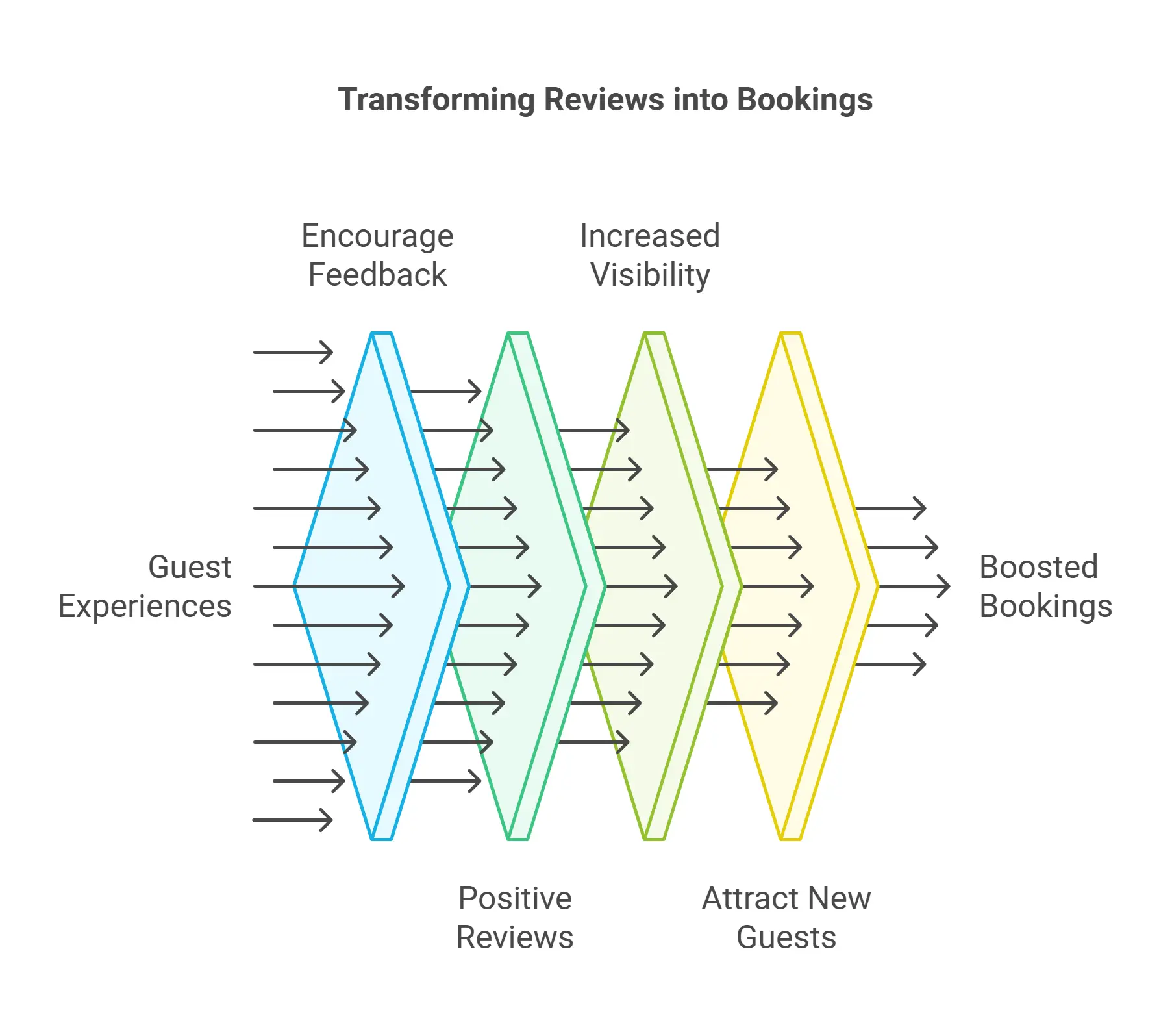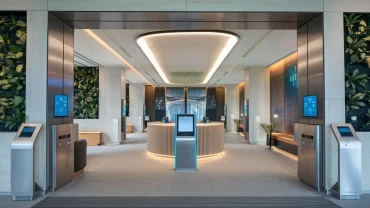In the digital age, online reviews are the cornerstone of a hotel’s reputation. For potential guests, reviews act as a virtual word-of-mouth, influencing their decision-making process and shaping their expectations before they even step foot on the property. According to industry studies, a significant majority of travelers rely heavily on reviews to choose where they’ll stay, making them a powerful tool for driving bookings and boosting revenue.

Positive reviews not only attract new guests but also build credibility and trust. They highlight the strengths of your services, enhance your visibility on search platforms, and often serve as the deciding factor when guests are torn between options. For hotels, cultivating a steady stream of glowing reviews is essential for staying competitive in an increasingly crowded marketplace.

This blog explores actionable strategies that hotels can use to encourage guests to share their experiences positively, fostering long-term success and a stellar reputation.
1. Provide Exceptional Service
The foundation of positive reviews lies in delivering an exceptional guest experience. Happy guests are more likely to take the time to share their satisfaction online, especially when their stay exceeds expectations.
Key Tactics:
Staff Training to Exceed Expectations
Train your team to go above and beyond in every interaction. Encourage staff to anticipate guest needs, offer personalized recommendations, and address requests with a sense of urgency and genuine care. When guests feel valued and appreciated, they’re more likely to leave positive feedback.
Proactive Problem Resolution
Resolving issues quickly and effectively can turn a potential negative review into a glowing testimonial. Equip your staff with the tools and authority to address complaints on the spot, ensuring that no guest leaves with unresolved grievances.
Creating Memorable, Personalized Experiences
Personal touches go a long way in leaving a lasting impression. Whether it’s a handwritten note, a complimentary treat, or a tailored experience based on guest preferences, these thoughtful gestures can transform a stay from satisfactory to unforgettable.
By focusing on creating exceptional moments, hotels can lay the groundwork for positive reviews, setting the stage for organic, heartfelt feedback from satisfied guests.

2. Make It Easy to Leave Reviews
Encouraging guests to leave reviews starts with making the process as effortless as possible. Even the most satisfied guests may hesitate to write a review if the steps involved feel cumbersome or unclear. By simplifying the process and embedding review prompts into key touchpoints, hotels can significantly boost their chances of receiving feedback.
Key Strategies:
Utilizing QR Codes in Rooms and Common Areas
Place QR codes in high-visibility areas like guest rooms, lobbies, or elevator panels. These codes should link directly to popular review platforms, allowing guests to leave feedback instantly with a quick scan using their smartphones.
Adding Review Links on Wi-Fi Login Pages and Post-Stay Emails
Wi-Fi login pages provide a natural opportunity to nudge guests toward leaving a review. Include a call-to-action alongside login details, encouraging guests to share their experience. Similarly, follow up with a post-stay email containing a direct review link to ensure the process remains straightforward and accessible.
Including Review Requests on Checkout Receipts
A simple message printed on checkout receipts, such as “We value your feedback! Please leave us a review at [insert link],” can serve as a final, friendly reminder. Guests often appreciate the subtle prompt as they reflect on their stay.

3. Timing Is Key
Timing plays a crucial role in securing reviews. Reaching out when the experience is still fresh in guests’ minds can dramatically increase response rates, as they are more likely to recall and share the highlights of their stay.
Key Tactics:
Casual Mention During Checkout by Front Desk Staff
During checkout, front desk staff can casually inquire about the guest’s experience and, if appropriate, encourage them to share their thoughts online. A personalized approach—such as thanking them by name and mentioning specific aspects of their stay—can make the request feel genuine and unobtrusive.
Sending a Follow-Up Email 24-48 Hours Post-Checkout
A well-timed follow-up email shortly after the guest departs is another effective way to capture reviews. The email should be concise, warm, and include a direct link to review platforms, making it convenient for guests to share their feedback while their memories are still fresh.
By simplifying the process and strategically timing review requests, hotels can significantly improve the volume and quality of feedback they receive, reinforcing their reputation and attracting future bookings.

4. Personalize Your Approach
Generic review requests often fail to make an impact. By tailoring requests to individual guests, hotels can create a sense of attentiveness and care, which increases the likelihood of receiving thoughtful feedback. A personalized approach shows guests that their experiences are valued and remembered.
Key Strategies:
Using Guest Names and Referencing Specific Aspects of Their Stay
When reaching out for reviews, address guests by their names and highlight unique aspects of their stay. For instance, mention how much you appreciated their visit or refer to specific services they enjoyed, such as a spa treatment or a special room upgrade. This personalized touch makes guests feel recognized and more inclined to respond.
Acknowledging Loyalty for Returning Guests
For repeat visitors, express gratitude for their continued patronage. Acknowledge their loyalty by referencing the number of stays or special milestones, like anniversaries or birthdays celebrated at the property. This not only strengthens the guest relationship but also increases the likelihood of a positive review reflecting their long-term satisfaction.

5. Incentivize Reviews
Offering small incentives can encourage guests to take the extra step of leaving a review, but it’s crucial to balance motivation with ethical considerations. The goal is to inspire authentic feedback without compromising the integrity of the review.
Key Strategies:
Discounts on Future Stays
Provide guests with a voucher or promo code for a discount on their next booking after they leave a review. This type of incentive not only encourages feedback but also fosters guest loyalty and repeat business.
Prize Drawings or Loyalty Points
Enter reviewers into a drawing for a prize, such as a complimentary stay, or reward them with loyalty points that can be redeemed for future perks. These incentives add an element of excitement and appreciation for their effort.
Ethical Considerations for Incentivizing Reviews
While incentives can boost review rates, it’s essential to avoid soliciting biased or dishonest feedback. Transparency is key—clearly state that the incentive is for leaving a review, regardless of whether it’s positive or negative. This ensures reviews remain genuine and builds trust with future guests.
By personalizing requests and offering thoughtful incentives, hotels can effectively encourage reviews while maintaining their ethical standards, fostering both guest satisfaction and long-term credibility.

6. Respond to All Reviews
Engaging with guest feedback is a critical component of reputation management. Whether the review is glowing or critical, responding thoughtfully shows that the hotel values its guests’ opinions and is committed to providing exceptional service.
Key Strategies:
Expressing Gratitude for Positive Reviews
When guests leave positive feedback, take the time to thank them personally. A simple yet heartfelt response not only strengthens the guest’s connection to your hotel but also demonstrates to potential guests that you appreciate and celebrate great experiences.
Addressing Concerns in Negative Reviews Professionally
Negative reviews offer an opportunity to showcase the hotel’s dedication to improvement. Respond promptly and professionally, acknowledging the guest’s concerns and outlining steps taken to resolve the issue. This transparency reassures future guests that their satisfaction is a top prior

7. Leverage Technology
Technology plays a pivotal role in streamlining the review process and maximizing its benefits. From automating outreach to analysing feedback trends, the right tools can help hotels manage guest reviews more efficiently and effectively.
Key Strategies:
Automated Post-Stay Emails
Implement systems that automatically send follow-up emails after checkout, requesting reviews. These tools can personalize emails with the guest’s name and stay details, making the request feel tailored while ensuring no opportunity for feedback is missed.
Review Management Software for Feedback Monitoring and Trend Analysis
Specialized platforms enable hotels to monitor reviews across multiple channels in real time. These tools simplify the process of responding to feedback and offer insights into common themes, helping hotels identify what they’re doing well and areas that need improvement.
Using Analytics to Identify Improvement Areas
Leverage analytics tools to examine review trends and pinpoint recurring issues or popular features. This data-driven approach allows hotels to focus their efforts on the areas that matter most to guests, driving continuous improvement and enhancing the overall guest experience.
By engaging with all reviews and utilizing technology to manage and analyse feedback, hotels can build trust, improve services, and foster a reputation that inspires guest loyalty and attracts new visitors.

8. Showcase Positive Reviews
Promoting positive feedback can inspire more guests to share their own experiences. By featuring glowing reviews, hotels can build trust, highlight their strengths, and reinforce their commitment to guest satisfaction.
Key Strategies:
Displaying Testimonials on the Website and Social Media
Share guest reviews prominently on your website’s homepage, booking pages, and social media platforms. Highlight specific stories that capture memorable experiences, showcasing what sets your hotel apart.
Using Review Widgets to Highlight Recent Feedback
Integrate widgets on your website that automatically pull recent positive reviews from platforms like TripAdvisor or Google. This dynamic approach keeps your feedback fresh and builds credibility with potential guests.
Sharing Overall Ratings and Counts to Build Trust
Display your overall star ratings and the number of reviews on your site and marketing materials. A high volume of positive feedback signals reliability and quality, boosting confidence among prospective guests.

Conclusion
Encouraging positive guest reviews is a multifaceted strategy that blends exceptional service, guest convenience, and proactive engagement.
Recap of Strategies:
- Deliver outstanding experiences to leave a lasting impression.
- Make it simple for guests to share their feedback.
- Personalize review requests to show attentiveness.
- Offer ethical incentives to encourage participation.
- Respond to all reviews to demonstrate value and accountability.
- Use technology to manage feedback efficiently.
- Highlight positive reviews to inspire confidence and attract new guests.
By implementing these strategies, hotels can foster a culture of guest appreciation, build a stellar reputation, and create a positive feedback loop that drives success. Now is the time to prioritize guest reviews—not just as a metric of performance but as a cornerstone of long-term growth and loyalty.
FAQ´s:
1. Why are online reviews important for hotels?
Online reviews are crucial for hotels as they build trust, attract new guests, and enhance visibility on search platforms. Positive reviews influence potential guests’ booking decisions, boosting occupancy rates and revenue.
2. How can hotels provide exceptional service to encourage positive reviews?
Hotels can deliver exceptional service by training staff to exceed expectations, resolving issues proactively, and creating personalized experiences such as tailored recommendations or thoughtful gestures like handwritten notes.
3. What is the best way to simplify the review process for guests?
Hotels can simplify the review process by using QR codes in rooms, including direct review links in post-stay emails, and adding review prompts on Wi-Fi login pages and checkout receipts.
4. Is it ethical to offer incentives for guest reviews?
Yes, offering incentives like discounts on future stays or loyalty points is ethical if done transparently. Ensure the incentive is for leaving any review—positive or negative—to maintain authenticity.
5. How can hotels effectively manage and respond to online reviews?
Hotels can use review management software to monitor feedback, respond promptly to both positive and negative reviews, and analyse trends to improve guest experiences and services.




Comment (0)